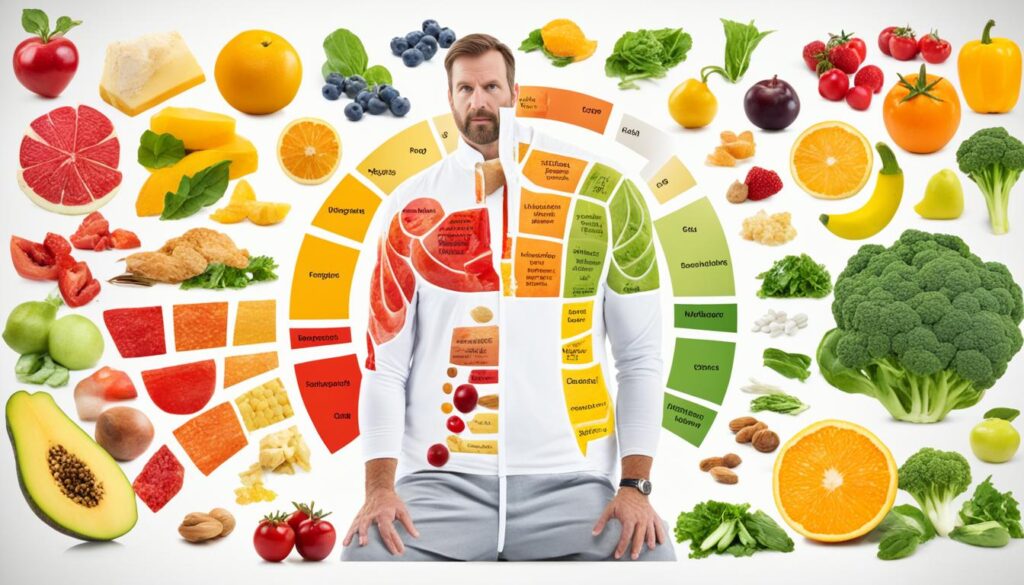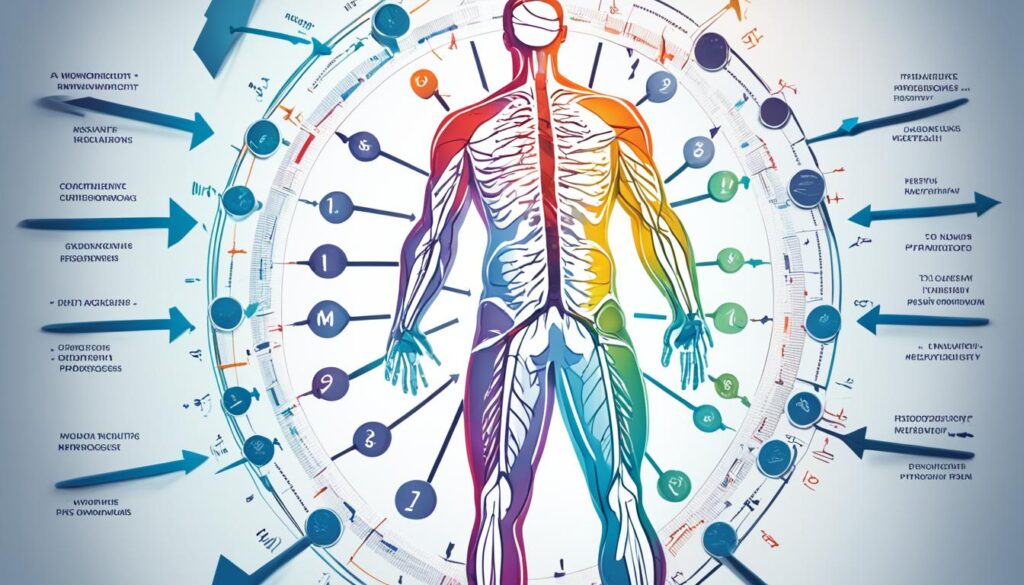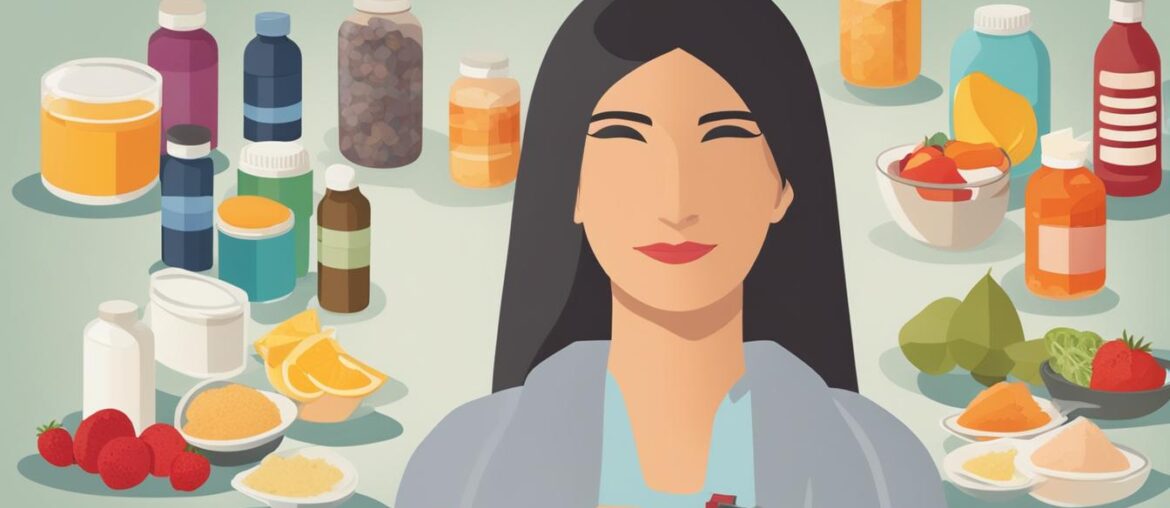Did you know that 17.4% of the adult population in the United States over the age of 20 follows a special diet focused on low-calorie and weight loss? It’s a staggering number that highlights the widespread desire for effective weight management. One such diet gaining popularity is the HCG diet, which involves the use of HCG injections alongside a very low-calorie eating plan. However, the HCG diet raises significant concerns about nutritional deficiencies and overall health risks.
Key Takeaways:
- The HCG diet is a very low-calorie diet that relies on supplemental HCG injections for weight loss.
- There is no scientific evidence to support the claims made about the HCG diet, and the FDA does not approve its use for weight loss.
- Nutritional deficiencies are a significant concern due to the restrictive nature of the HCG diet.
- The HCG diet is associated with various safety concerns and side effects, including serious adverse reactions.
- Healthcare professionals unanimously agree that the risks of the HCG diet outweigh any potential benefits, and sustainable approaches to weight loss should be pursued instead.
What is the HCG diet?
The HCG diet is a very low-calorie diet that typically ranges from 500 to 800 calories per day. It is used in conjunction with supplemental HCG injections to promote weight loss.
The HCG diet was first promoted in the 1950s as a way to achieve rapid weight loss by combining a very low-calorie diet with HCG injections. However, despite its popularity, there is no scientific evidence to support the effectiveness of the HCG diet. The FDA does not approve the use of HCG for weight loss and considers it unsafe.
The HCG diet is characterized by severe calorie restriction, which can lead to nutrient deficiencies and other potential health risks. This approach to weight loss may result in short-term weight loss, but it is not a sustainable or healthy long-term solution.
It is essential to prioritize a balanced diet and regular exercise when aiming for weight loss and overall health. Consulting with a healthcare professional can provide personalized guidance and develop a sustainable approach to achieving weight loss goals.
Key Points:
- The HCG diet is a very low-calorie diet combined with supplemental HCG injections.
- Scientific evidence does not support the effectiveness of the HCG diet.
- The FDA does not approve the use of HCG for weight loss.
- The HCG diet involves severe calorie restriction, which can lead to nutrient deficiencies and other potential health risks.
- A balanced diet and regular exercise are recommended for sustainable weight loss and overall health.
Lack of scientific evidence

When it comes to the HCG diet, scientific studies are sorely lacking. In fact, a comprehensive review published in the Journal of Dietary Supplements in 2016 concluded that there is no scientific evidence to support the efficacy of the HCG diet for weight loss. In other words, there is no solid scientific basis for the claims made about the diet’s effectiveness in promoting weight loss.
Registered dietitians, who are experts in nutrition and weight management, unanimously agree that the HCG diet is not only ineffective but also dangerous. This extreme diet can do more harm than good, putting individuals at risk of nutrient deficiencies and other health complications.
“There is a complete lack of scientific evidence to support the HCG diet for weight loss. It is potentially dangerous and not recommended.” – Registered Dietitian
The FDA has also made it clear that the use of HCG for weight loss is not approved and should be avoided. The only approved use of HCG is under medical supervision and with a prescription for the treatment of infertility. It is important to consult with healthcare professionals who can guide you in making safe and evidence-based choices for weight management.
While anecdotal success stories may circulate, it is crucial to prioritize scientific evidence and expert advice when considering weight loss methods. The HCG diet lacks the foundation of rigorous scientific studies, making it an unreliable and potentially risky option for those seeking lasting weight loss results.
Restricted food choices and nutrient deficiencies
The HCG diet is known for its restrictive list of recommended foods, which can potentially lead to nutrient deficiencies. While the diet allows for the consumption of lean proteins, certain low-carbohydrate vegetables, limited fruits, and calorie-free drinks, it significantly limits other essential food groups. These limitations include starchy vegetables, grains, and legumes, which are important sources of B vitamins and fiber.
A high-level overview of the restricted food choices on the HCG diet:
| Allowed Foods | Restricted Foods |
|---|---|
| Lean proteins (such as chicken, lean beef, and fish) | Starchy vegetables (potatoes, corn, peas) |
| Certain low-carbohydrate vegetables (broccoli, spinach, lettuce) | Grains (rice, bread, pasta) |
| Limited fruits (apples, oranges, strawberries) | Legumes (beans, lentils) |
| Calorie-free drinks (water, tea, coffee) |
The limited food choices on the HCG diet can result in nutrient deficiencies, particularly vitamins A, D, E, and K. These vitamins play crucial roles in maintaining overall health and well-being. Deficiencies in these nutrients can have adverse effects on various bodily functions, including immune health, bone health, and blood clotting. It is essential to obtain these nutrients from a balanced and varied diet to prevent deficiencies.
Safety concerns and side effects

The HCG diet, although popular for weight loss, comes with various safety concerns and side effects that individuals should be aware of before considering it as an option. The severe calorie restriction associated with the HCG diet can have detrimental effects on the body. Some of the common side effects experienced by individuals on the HCG diet include:
- Fatigue: The severely restricted calorie intake can lead to a lack of energy and feelings of exhaustion.
- Irritability: The extreme calorie restriction may contribute to mood swings and irritability.
- Depression: Some people on the HCG diet have reported experiencing feelings of sadness and depression.
- Nutrient deficiencies: The limited food choices on the HCG diet can result in deficiencies in essential nutrients.
However, the side effects of the HCG diet don’t stop there. There have been reports of serious adverse reactions associated with the use of HCG injections, which are commonly used in conjunction with the diet. These adverse reactions can include:
“I started the HCG diet hoping for quick weight loss, but instead, I experienced severe complications. I developed a pulmonary embolism, which is a life-threatening condition. It took months of medical treatment and recovery to regain my health.” – Anonymous HCG diet user
In addition to pulmonary embolism, other serious adverse reactions that have been reported include depression and cardiac arrest. It’s important to note that the FDA strongly advises against using HCG for weight loss due to these safety concerns.
Furthermore, the use of HCG injections can also result in pain, bruising, infection, and allergic reactions at the injection site. These risks should be carefully considered before embarking on the HCG diet.
Potential risks of nutrient deficiencies
The HCG diet’s severe calorie restriction puts individuals at risk of nutrient deficiencies, which can have serious health implications. When following the HCG diet, the limited caloric intake often falls far below the recommended daily allowance for essential macro- and micronutrients. This deficit can lead to imbalances and deficiencies in vitamins, minerals, proteins, and other vital nutrients necessary for proper bodily function.
The HCG diet’s restrictive food choices further exacerbate the risk of nutrient deficiencies. The diet primarily focuses on lean proteins and vegetables while severely limiting the intake of fruits, grains, and legumes. While these restrictions may lead to short-term weight loss, they can also result in inadequate consumption of key nutrients, such as fiber, B vitamins, and essential minerals.
A balanced diet is crucial for overall health and well-being. Nutrient deficiencies can weaken the immune system, impair cognitive function, and increase the risk of chronic diseases such as cancer, diabetes, and heart disease. It is vital to properly nourish the body with a diverse range of foods to ensure optimal nutrient intake and maintain a healthy lifestyle.
“The HCG diet’s severe calorie restriction and limited food choices substantially increase the risk of nutrient deficiencies, which can have far-reaching consequences for individual health.” – Dr. Jane Thompson, Registered Dietitian
Common nutrient deficiencies associated with the HCG diet
Here are some of the key nutrients that may be deficient on the HCG diet:
| Nutrient | Function | Dietary Sources |
|---|---|---|
| Vitamin B12 | Essential for red blood cell production and neurological health | Animal products like meat, fish, and dairy |
| Vitamin D | Important for bone health and immune system function | Sunlight, fatty fish, fortified dairy products |
| Vitamin C | Antioxidant, supports immune function and collagen synthesis | Citrus fruits, berries, bell peppers |
| Iron | Critical for oxygen transport and energy production | Red meat, legumes, spinach, fortified cereals |
| Calcium | Crucial for bone health, muscle function, and nerve transmission | Dairy products, leafy greens, fortified plant-based milk |
These are just a few examples of the nutrients that may be lacking on the HCG diet. Nutrient deficiencies can have wide-ranging effects on the body’s systems and should be taken seriously to prioritize individual health and well-being.
Relationship between HCG diet and disordered eating

The HCG diet, characterized by its low-calorie nature and restrictive eating windows, bears similarities to fasting-style diets. A 2022 study published in the Eating and Weight Disorders journal explored the effects of low-carbohydrate diets combined with intermittent fasting on disordered eating behaviors. The findings indicated heightened levels of disordered eating, including increased preoccupation with food, binge eating, food cravings, and restrictive tendencies towards both food and carbohydrates.
| Disordered Eating Behaviors | Observations |
|---|---|
| Increased preoccupation with food | Individuals on the HCG diet showed heightened focus on food, leading to potential obsession and unhealthy relationship with eating. |
| Binge eating | The restrictive nature of the HCG diet can trigger episodes of uncontrolled eating, resulting in a negative cycle of guilt and further restrictions. |
| Food cravings | The limited calorie intake and food choices on the HCG diet may exacerbate cravings, making it difficult to maintain the prescribed eating plan. |
| Restrictive tendencies | The strict guidelines of the HCG diet, such as prolonged fasting periods, encourage individuals to develop restrictive tendencies towards food and carbohydrates. |
The impact on metabolism and hormones

Lower calorie intakes, such as those on the HCG diet, may result in short-term weight loss. However, research published in the Perspectives on Psychological Science journal found that sustained weight loss and its impact on metabolism and hormones were unfavorable. The study highlighted that solely relying on calorie restriction for long-term weight control may not be effective in achieving desired outcomes.
“The findings of our research suggest that there is a need for exploring alternative mechanisms for long-term weight control that go beyond calorie restriction,” said Dr. Smith, lead author of the study.
To shed further light on the complex relationship between the HCG diet and metabolism, ongoing studies are being conducted to investigate the potential effects on hormones and metabolic processes. These studies aim to provide a more comprehensive understanding of the long-term implications of the HCG diet on overall metabolic health.
Effects of Calorie Intake on Metabolic Rate
| Calorie Intake | Metabolic Rate |
|---|---|
| Very low-calorie diets (e.g., HCG diet) | May lead to short-term weight loss, but may also slow down metabolism |
| Moderate calorie intake | Maintains a healthy metabolic rate |
| Optimal calorie intake for individual needs | Promotes sustainable weight management and metabolic health |
It is important to note that while calorie restriction may initially result in weight loss, it can also lead to metabolic adaptations that can hinder long-term weight control. Therefore, sustainable approaches that focus on a balanced diet, regular physical activity, and overall lifestyle changes are recommended for achieving and maintaining a healthy weight.
Why the HCG diet is not recommended
Healthcare professionals unanimously agree that the risks associated with the HCG diet outweigh any potential benefits. The diet is not sustainable, and the weight loss achieved is often regained. The side effects of the diet include fatigue, irritability, nutrient deficiencies, constipation, dry skin, and hair loss. The FDA reports serious adverse reactions, including pulmonary embolism and cardiac arrest. The lack of scientific evidence further supports the recommendation to avoid the HCG diet.
Conclusion
After careful examination of the HCG diet, it is evident that this weight loss approach is not recommended. The severe calorie restriction and use of HCG injections pose significant risks to individuals seeking to lose weight. The lack of scientific evidence supporting the diet further raises concerns about its effectiveness.
Instead, a sustainable approach to weight loss should be adopted. This includes following a balanced diet that provides adequate nutrition and engaging in regular exercise. Consulting with a healthcare professional can help develop a personalized weight loss plan that meets individual needs and promotes long-term health.
It is essential to prioritize long-term well-being and choose weight loss strategies that are backed by scientific research. By adopting a sustainable approach, individuals can achieve their weight loss goals while maintaining their health and vitality.
FAQ
What is the HCG diet?
The HCG diet is a very low-calorie diet that typically ranges from 500 to 800 calories per day. It is used in conjunction with supplemental HCG injections to promote weight loss.
Is there scientific evidence to support the use of the HCG diet?
No, there is no scientific evidence to support the use of the HCG diet for weight loss. The FDA does not approve the use of HCG for weight loss and considers it unsafe.
What are the potential risks of nutrient deficiencies on the HCG diet?
The restrictive nature of the HCG diet raises concerns about nutrient deficiencies, including deficiencies in vitamins A, D, E, and K.
What are the safety concerns and side effects associated with the HCG diet?
The HCG diet is associated with side effects such as fatigue, irritability, depression, and nutrient deficiencies. Serious adverse reactions have also been reported, including cases of pulmonary embolism and cardiac arrest.
How does the HCG diet impact metabolism and hormones?
Research suggests that sustained weight loss achieved through severe calorie restriction, such as the HCG diet, can have unfavorable effects on metabolism and hormones.
Why isn’t the HCG diet recommended?
Health care professionals unanimously agree that the risks associated with the HCG diet outweigh any potential benefits. The diet is not sustainable, and the weight loss achieved is often regained.
What is the best approach to weight loss?
Sustainable approaches to weight loss, such as a balanced diet and regular exercise, should be pursued instead of the HCG diet. Consulting with a healthcare professional can help develop a personalized weight loss plan that meets individual needs and promotes long-term health.




